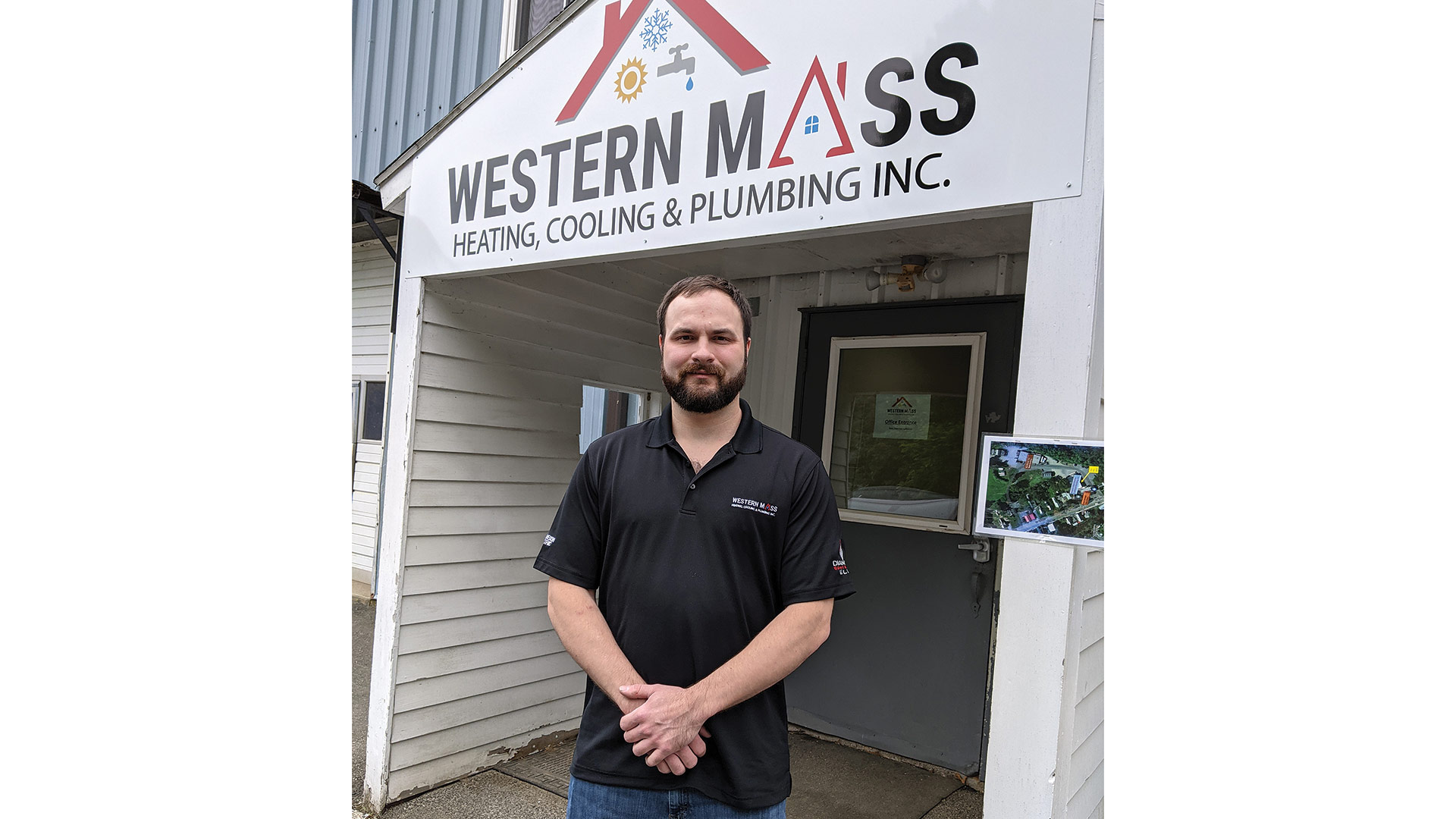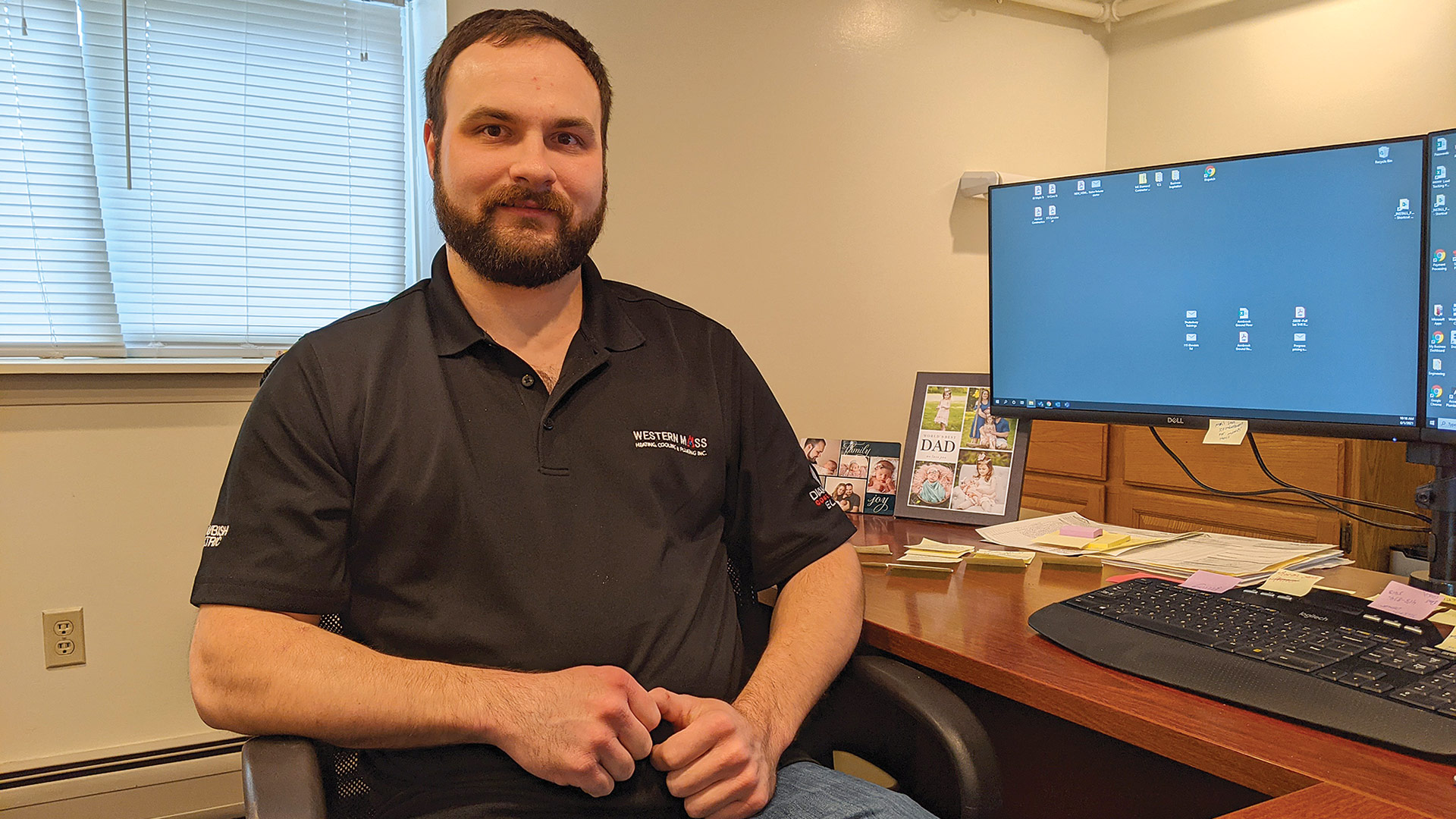Scott Cernak Sets His Own Course with New Company
Cernak #Cernak


Scott Cernak’s expertise and development of the residential division at M.J. Moran are serving him well today as the head of his own venture.
Never underestimate the influence of a teacher.
Or, in Scott Cernak’s case, two of them, who taught plumbing when he was a student at Smith Vocational & Agricultural High School, and proved engaging enough in the subject to capture his attention.
“I wasn’t sure which trade I wanted to take,” he said. “The plumbing teachers there were really good — I never thought I would have chosen plumbing, but I ended up liking it quite a bit.”
He likes the trajectory of his career as well. Today, Cernak is the owner of a company — Western Mass Heating, Cooling & Plumbing — that recently spun off M.J. Moran Inc., the only company he’d ever worked for, and where he latched on as an intern early in his junior year at Smith.
“I started on my 16th birthday and started liking it more and more,” he recalled. “I got into more and more things; I started doing sprinkler fitting, all kinds of pipe fitting, welding and plumbing and HVAC.”
“It was a really good, mutually beneficial decision to have us part ways and for me to buy the division.”
All of that appealed to him, but he was especially interested in the residential division, which hadn’t been a significant part of Moran’s business, but which he and two other employees started growing steadily. “At this point, I was in my early 20s and running a lot of large residential and small commercial jobs, new-construction service calls — anything from packing a faucet to doing a whole new house and everything in between.”
His success in that division led to a promotion to general manager of the company in 2016, and something bigger four years later. “I got the opportunity to buy the division that I helped build,” he told BusinessWest, “and here we are.”
The reason for the spinoff company is that Jim Moran, who launched his enterprise 42 years ago, is heading — slowly — toward retirement, Cernak explained.
“He’ll never fully retire, but he wanted to take a little off his plate right now. His sons, Chad and Kyle, who run the commercial-industrial division, don’t have any interest in the residential divison — they relied on me for that anyway — so it just made sense for Jim and myself and our departments.
“It was a really good, mutually beneficial decision to have us part ways and for me to buy the division; it worked really well for them, and it’s worked really well for us,” he went on. “We still communicate frequently, and we still collaborate; I hire them as a sub when we need extra manpower, or they hire us as a sub on some jobs. So it works out pretty well.”
Roughly eight months into his new enterprise, Cernak said his work is well-balanced, split fairly evenly between service work, major renovations for general contractors, and installing and replacing heating and cooling systems. “It’s a pretty good mix, and some of that is commercial, too — service work and small installation work.”
Western Mass Heating, Cooling & Plumbing is more departmentalized than most similar firms, he added, with a full service department.
“Most companies around us don’t have a service department; they just throw in a service call here and there. We actually have a service department that’s dedicated to service work, then we have a new-construction installation department that’s dedicated to the bigger work. That works well for our dispatching and keeping things organized and keeping the right guys on the right jobs. It’s one reason we’re able to stay efficient and continue to grow.”
Into the Pipeline
What first drew Cernak into the plumbing field at Smith Voke was, simply, realizing for the first time the breadth of what tradespeople in that field do.
“As a teenager, I didn’t realize that plumbing was more than just cleaning a drain or fixing a toilet. A lot of people — not just young teenagers — think plumbing is just fixing plumbing; they think it’s just dirty work. But I got to see a different side of it — learning how the pipefitting works, doing some welding and some soldering.”
“Even before 2020, new houses were getting a lot tighter, and indoor air quality was becoming a much higher priority for people.”
He also quickly learned, by researching the field, that it’s a trade with stability and good job security. “It’s one of the higher-paid trades, so there were a lot of factors. But before that, it had never clicked to me that, hey, plumbers actually install the plumbing in a new house, too, not just fix the plumbing in an old house.”
The science of plumbing hasn’t changed much during his career, but HVAC is a different story.
“Indoor air quality has been a big factor,” he said. “Coronavirus certainly helped with that — or hurt with that, however you want to put it. But coronavirus certainly put a new spin on it. But even before 2020, new houses were getting a lot tighter, and indoor air quality was becoming a much higher priority for people, so we sell a lot of products that help with filtration and literally zap bacteria and viruses out of the air; there are all kinds of air-cleaning products that we’re selling as part of our systems, part of our installations, part of our services. It’s not the core of our business, but it certainly is a pretty big part of our business.”
Businesses in Massachusetts took the lead on emphasizing air-quality measures indoors, much of it driven by regulations. But in the era of COVID-19, people increasingly demand high-tech air-purifying systems in their homes.
“We’d never had people asking for indoor air-quality measures — or very rarely; maybe 1% of people would ask for something like that back before coronavirus. And now, probably close to 20% to 30% ask for it specifically.”

Scott Cernak said his company is growing and hiring, even though his industry is challenged by a slow pipeline of young talent entering the field.
Clearly, there will always be a market for plumbing and HVAC work — as Cernak said, this is a stable field — and he can see his fledgling company growing, but one challenge will be attracting talent as it does. Right now, nationwide, roughly three workers are aging out and retiring from these disciplines for every two young people who come in.
“And out of those two, probably only one to one and a half are going to make it past five years,” he went on. “So there’s a big-time shortage, and it’s going to get worse and worse.”
As one way to counter that trend, “I have longer-term goals of creating more education within our company,” he explained. “I’d like to bring a sheet-metal school in house, not necessarily from us, but probably third-party, using our facility; that’s going to help attract some people.”
Meanwhile, “we have ads out on different internet platforms, and we’re trying to recruit internally too. Everyone who works with us knows we’re looking for at least one or two more service techs on top of other positions as well. We have been hiring — four people in the past month and a half — so we’re definitely growing, and we’re on a trajectory of more growth as well.”
Investments in the Future
One key to achieving that growth, Cernak said, is not being afraid to invest in the kinds of things that will attract top talent.
“I’ve got an eye for talent — and I’m not afraid to hire the best and pay for the best, that’s for sure,” he told BusinessWest. “I provide the best tools, the best training, we have new, well-equipped trucks, and we’re working on getting even more trucks. So all our people have the right tools, the right trucks, and the right infrastructure to do their jobs.”
In addition, “I’ve invested heavily into software and IT systems to organize how we do our work and how we bill for our work and how we store data and how we access data, which is a huge part of the industry that people generally overlook,” he went on. “We’re not fumbling through file cabinets to find the customer’s history. With a couple clicks, we’re there. Same thing with our guys in the field — they have access via tablet or smartphone to access any of our customers’ history. When a customer calls, we know what they have already, and we know the right tech to send to the right job.”
What it adds up to is efficiency, which both employees and customers appreciate, Cernak said. “We’re very good in the service department, dispatching, getting people there. We have quite a backlog sometimes, but we’re also very good at prioritizing emergencies.”
Creating efficient systems and investing in better resources may not bring an immediate payback, he added, but he’s looking long-term — at the kind of success his mentor, Jim Moran, enjoyed for more than four decades. It’s why, when he saw an opportunity to build upon his experience and set out on his own, he took it.
“Sometimes,” he said, “you’ve got to go with your gut and know what’s right and do it.”
Joseph Bednar can be reached at [email protected]